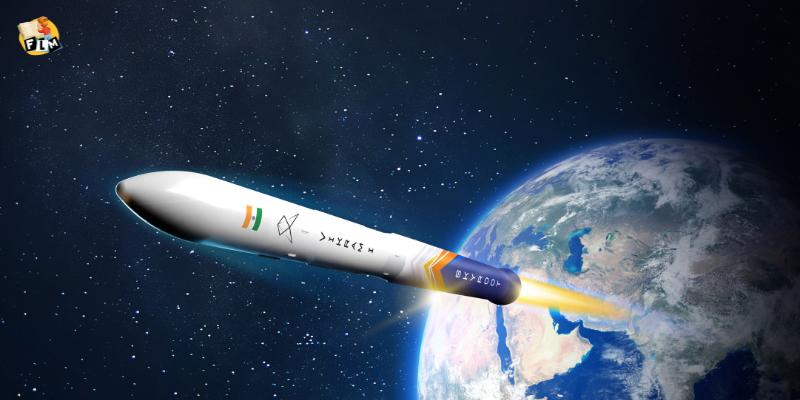Skyroot Aerospace, which creates rockets and is a service provider for launches in India’s space business, is transforming the space sector in India like no other private company ever did. The company was established in July 2018 by Pawan Kumar Chandana, and Naga Bharat Daka, who had earlier worked as scientists at ISRO.
Started in Hyderabad ,Telangana. Skyroot’s goal? To “open space for all.” The company plans to build a bunch of rockets that can send small satellites to space meeting the growing needs of the worldwide satellite market.
Early Days and Vision
Skyroot kicked off in a small office in Kondapur with ten people on board. The founders had a big dream: to make space accessible to everyone. They used their years of know-how from ISRO to come up with new ways to launch rockets. The company took off getting a boost from T-Hub and support from T-Works. This made Skyroot the first private company in India to launch rockets.
How Skyroot Aerospace Began
Chandana and Daka’s shared dream sparked Skyroot Aerospace’s creation. Their time at the Indian Space Research Organisation (ISRO) on key projects like the Polar Satellite Launch Vehicle (PSLV) and the GSLV Mk-III showed them how private companies could fit into India’s space industry.
As ISRO kept succeeding and private spaceflight grew worldwide, they spotted a chance to start a private space company offering cheap and dependable launch services.
Fresh Ideas at Its Heart
Skyroot’s rockets are designed with modularity and cost-effectiveness in mind. They incorporate advanced technologies such as 3D printing for engine components, which reduces manufacturing time and costs. The use of carbon composites in the rocket’s structure ensures a lightweight design, further enhancing payload capacity.
Skyroot stands out because it’s dedicated to quick launches. The company wants to slash the time it takes to get a rocket ready for takeoff from months to just days. This fast turnaround is key in today’s space competition where time matters just as much as the tech itself.

Skyroot has hit several big milestones along the way
Funding and Recognition
At first, the company got $4.3 million, with big help from space and defense contractor Solar Industries. In May 2021, Skyroot raised $11 million in a Series A funding round. This money was key to build its first launch vehicle Vikram-1.
The company’s good work earned it the National Startup Awards 2020. It also won a National Award at the National Technology Day 2022 for its new ideas in propulsion tech.
Partnerships
Skyroot made smart team-ups. It signed a deal with ISRO giving it access to expert know-how and facilities. Working with other space firms, like Bellatrix Aerospace, made the company even stronger.
Launch Achievements of Skyroot Aerospace
On November 18, 2022, Skyroot launched its Vikram-S suborbital rocket . This made them the first Indian private company to reach outer space, with the rocket going as high as 89.5 km. This launch played a key role to test the technologies in their rockets and paved the way for future missions.
The Vikram Series
Skyroot is working on the Vikram series of launch vehicles. They named these rockets after Dr. Vikram Sarabhai, who started India’s space program. The Vikram-I can carry loads up to 480 kg to Low Inclination Orbit.

The next models, Vikram-II and Vikram-III, will handle bigger loads of 595 kg and 815 kg. The team built these rockets to launch . They can set up and launch within 24 hours from any place. This meets the growing need to put satellites in orbit on short notice.
Recent Developments in Skyroot Aerospace
As of October 2023, Skyroot secured $27.5 million in a successful pre-Series C funding round. Temasek Holdings led this effort pushing Skyroot’s total funding to about $95 million. This cash injection aims to speed up its launch schedule in the next two years. The company is getting ready for a thrilling future in the competitive space industry.
Key Investors in Skyroot Aerospace
Temasek Holdings: Based in Singapore, Temasek is an investment firm based around the globe and was a lead investor in this earlier pre-Series C round for Skyroot that brings its total capital raised to nearly $95 million.
Celesta Capital : A venture capitalist that invests in tech driven companies, and one of the long term backers for Skyroot.
Rocketship. vc: A venture capital firm that invests in early-stage technology companies, and has invested into every round of funding by Skyroot for aerospace industry.
Artha Venture Fund: A Seed-First, pre-Series-A fund backing the boldest & most innovative startups in India and who has been a part of the funding rounds for Skyroot
Mayfield India: This firm is part of the global Mayfield Fund and it invests in early-stage companies including Skyroot.
Pi Ventures: This venture capital firm had invested in deep tech and AI-driven startups indirectly to the list of Skyroot funders.
Speciale Invest: Another venture capital firm that focuses on technology startups and has invested in Skyroot.
Conclusion
Skyroot Aerospace leads India’s private space revolution mixing new ideas with a goal to make space reachable. With its bold plans and proven success, the company is ready to have a big impact on the world’s space economy.
It supports the growing need to launch small satellites and helps achieve broader space exploration aims. As Skyroot keeps pushing the limits of technology and cost-effectiveness, it’s writing a new chapter in Indian aerospace history.
